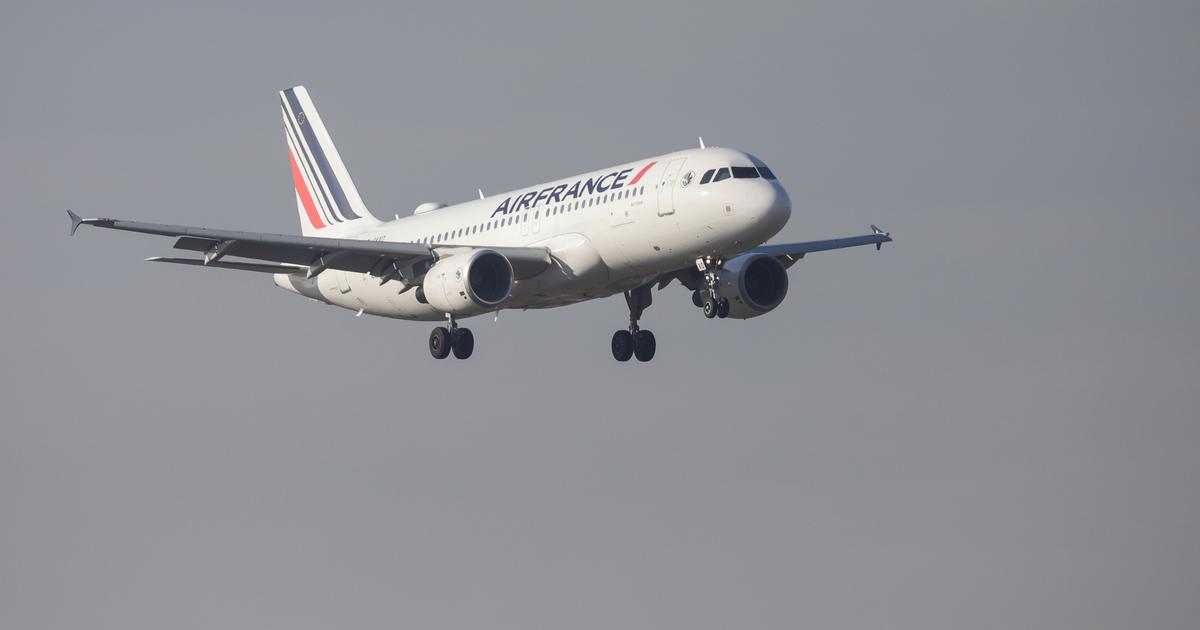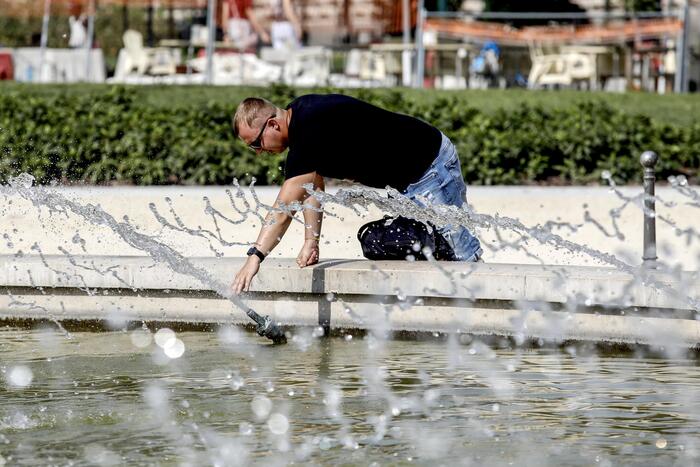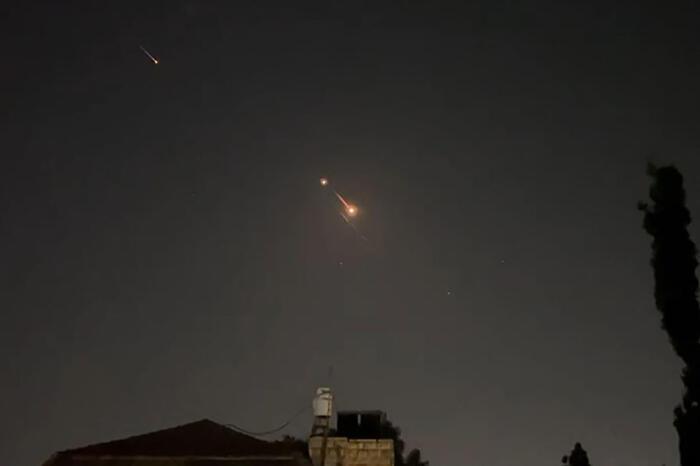The Middle East is one of the hardest hit by climate change - temperatures above 50 degrees Celsius are already a reality.
The region is barely equipped to deal with the problem.
Climate change is already being felt strongly in the Middle East: In several countries, temperatures above 50 degrees were measured in summer.
Correspondent Anchal Vohra believes that the states of the regions are particularly vulnerable - also because they are led by ineffective governments, clerics or autocrats.
This article is available in German for the first time - it was first published on August 24, 2021 by the magazine "Foreign Policy".
Beirut - This summer, several picturesque Middle Eastern countries became powder kegs.
Extreme temperatures and severe droughts devastated the region, forests burned and cities became islands of unbearable heat.
In June, Kuwait recorded a temperature of 53.2 degrees Celsius and Oman, the United Arab Emirates and Saudi Arabia were all above 50 degrees.
A month later, the temperatures in Iraq * rose to 51.5 degrees and in Iran * just under 51 degrees were measured.
The worst part is that this is just the beginning of a trend. The Middle East is warming twice as fast as the global average and will be 4 degrees Celsius warmer by 2050 - far from the 1.5 degree mark that scientists have set to save humanity. According to the World Bank, extreme climates will become routine and the region could be under the blazing sun for four months each year. According to the Max Planck Institute, many cities in the Middle East could literally become uninhabitable before the end of the century. And the war-ravaged and sectarian region may be particularly ill-prepared for the challenges that threaten its collective existence.
Climate crisis: The Middle East is particularly vulnerable - also because of clerics and autocrats at the top of the state
Since the region is divided into rich and poor, it is the poorer inhabitants of the oil-rich countries who are the first to be confronted with social unrest because they lack basic supplies - for example water and electricity - that people need to survive in the extreme heat urgently need. Ruled by ineffective governments, autocrats, or clerics, these countries have crumbling energy infrastructures and ingrained structural flaws that block the promotion and technological innovation of renewable energy. According to experts, political and economic reforms that strengthen institutions and encourage free thinking in companies are crucial to reducing carbon emissions and transitioning to clean energy in the Middle East.
Greenhouse gas emissions have more than tripled in the region in the last three decades and have raised concerns among experts that a steep rise in temperature on the one hand and the lack of basic services on the other are making the region an even more hopeless and dangerous place do.
According to Jos Lelieveld, an expert on the climate in the Middle East and the Mediterranean at the Max Planck Institute, the Middle East has overtaken the European Union in terms of greenhouse gas emissions, even though it is "particularly hard hit" by climate change.
"In several cities in the Middle East, temperatures have risen to well over 50 degrees Celsius," says Lelieveld.
"If nothing changes, cities could experience temperatures of 60 degrees Celsius in the future, which will be dangerous for people without access to air conditioning."
Iran, Iraq and Co .: Temperatures over 60 degrees are threatening - protest and anger are already breaking out
In countries like Iran, Iraq, Lebanon, and Syria and Yemen, air conditioning has become a luxury even for the relatively wealthy. Tainted by war, Western sanctions, or a self-serving ruling elite, these countries have seen widespread protests against the lack of basic services while temperatures rise and droughts dry out the fields. The scenes of social unrest enabled a glimpse into the future of the region, which is feeling the effects of climate change particularly acutely.
In Iraq, the record-breaking heat in July drove people onto the streets. They blocked roads, burned tires and in their anger surrounded power plants that had to be secured by the armed forces. Ironically, oil-rich Basra, southern Iraq, has been among the longest of blackouts, and the city has been the epicenter of demonstrations that have killed at least three Iraqis. According to experts, political instability is the main cause of the electricity crisis in Iraq.
A similar scenario unfolded in Lebanon this month. The Lebanese have faced countless crises and are frustrated by the inaction of the political elite. When the fuel ran out, chaotic scenes broke out across the country. Some people looted tankers, others looted power plants, and still others carried firearms to the gas stations to get in line with hundreds. Three-hour blackouts have been the norm in Lebanon since the end of the civil war in 1990. However, after the economy collapsed in 2019, the blackouts became longer and longer and the generators louder and louder. They roared across the country. On August 12, the central bank lifted fuel subsidies and the generators dried up. The lights went outand even people in the affluent neighborhoods who are used to air conditioning have had to deal with the sweltering heat. The local press reported almost daily of clashes between people at gas stations, which required the participation of the Lebanese army to oversee the distribution and keep the peace. In one incident, a confiscated tanker truck exploded, killing nearly 30 people while the Lebanese army was distributing gasoline. According to the doctors, the bodies were charred beyond recognition.which required the participation of the Lebanese army in overseeing the distribution and keeping the peace. In one incident, a confiscated tanker truck exploded, killing nearly 30 people while the Lebanese army was distributing gasoline. According to the doctors, the bodies were charred beyond recognition.which required the participation of the Lebanese army in overseeing the distribution and keeping the peace. In one incident, a confiscated tanker truck exploded, killing nearly 30 people while the Lebanese army was distributing gasoline. According to the doctors, the bodies were charred beyond recognition.
Middle East: Drought paralyzes hydropower plants in Iran
The political class in Lebanon has clung to power and refused to introduce reforms to rehabilitate the highly subsidized but deficit electricity sector.
According to experts, Lebanon has enormous potential with which it could not only make the project profitable, but also use these profits to diversify the energy mix and to use the abundant wind and solar energy.
A coherent policy would not only bring recovery in the hot months, but also reduce carbon emissions and thus global warming.
In 2017, Iran recorded the hottest official temperature in the region at 54 degrees Celsius and also exceeded 50 degrees in July. However, repeated periods of drought have made the country's hydropower plants obsolete and have resulted in a decline in production, even though demand for electricity is increasing. Protests broke out in various cities in Iran in July, with some demonstrators chanting "Death to the Dictator" and "Death to Khamenei", alluding to Ayatollah Ali Khamenei, "Supreme Leader" of Iran and the most powerful man in the country.
In the province of Khuzestan in southwest Iran, people blocked roads and burned tires to protest the water shortage.
At least three protesters were killed, allegedly by gunfire by state security forces, with human rights activists claiming the number was higher.
Human Rights Watch said that videos posted on social media showed security officers using guns and tear gas to shoot protesters, and called for an investigation into the deaths.
Climate problems causing unrest in the Middle East?
Expert calls for more cooperation in the region
The droughts in Syria between 2006 and 2011 deepened the socio-economic gap between rural and urban areas and are believed to be one of the causes of the Syrian civil war. In Yemen, the protracted war seems to have exacerbated the water crisis. Yemen's underground freshwater springs are drying up quickly, leaving the country arid. The Yemeni annual per capita share of water is only 120 cubic meters, compared to the global per capita share of 7,500 cubic meters. Before the war, the Yemeni Ministry of Water had set conditions for drilling wells, but monitoring them was impossible during the conflict. Over the past decade, Yemen has rapidly depleted its already meager freshwater resources.
Johan Schaar, Associate Senior Fellow at the Stockholm Peace Research Institute, believes that regional cooperation could defuse the water crisis and reduce the region's carbon footprint. “The most important thing for regional cooperation is the agreement on the use and management of shared water resources, which are becoming increasingly scarce and unstable due to extreme weather events; this applies to both rivers and groundwater, ”says Schaar, an expert on climate change. “There are few bilateral cross-border water agreements and no catchment-wide agreements for rivers shared by several countries. A few years ago, the Council of Water Ministers within the Arab League drafted a regional agreement on shared water resources,but that was never ratified. "
Instead of working together to use common resources, the region is embroiled in conflict. "None of the countries has invested more than just a small amount in reducing [greenhouse gas] emissions," said Schaar. “In addition, conflict, instability and sanctions affect their needs and adaptability. Conflicts displace and impoverish the population, making them more vulnerable to the effects of climate change. Instability limits the resources and policy space for long-term planning and the investment needed to adapt. "
The connection between climate change and the revolutions and wars of the Arab Spring is controversial.
However, there are clear and indisputable links between poor governance, environmental mismanagement, urbanization and unrest in communities that are poorly supplied with water, air conditioning and other amenities.
It's scary to think about what will happen in these cities if climate change continues to worsen living conditions but standards of governance remain the same.
"Climate change and the resulting increase in extreme weather conditions intensify the challenges that arise from regional conflicts, which in turn creates additional incentives for emigration, for example," says Lelieveld.
by Anchal Vohra
Anchal Vohra
lives in Beirut and is a columnist for
Foreign Policy
and a freelance TV correspondent and commentator for the Middle East.
Twitter: @anchalvohra
This article was first published in English on August 24, 2021 in the magazine “ForeignPolicy.com” - as part of a cooperation, a translation is now also available to readers of the IPPEN.MEDIA portals. * Merkur.de is an offer from IPPEN.MEDIA.
+
Foreign Policy Logo
© ForeignPolicy.com



/cloudfront-eu-central-1.images.arcpublishing.com/prisa/JNAMK37HFIZKML76SWBTDTD3QI.jpg)







/cloudfront-eu-central-1.images.arcpublishing.com/prisa/KMEYMJKESBAZBE4MRBAM4TGHIQ.jpg)


